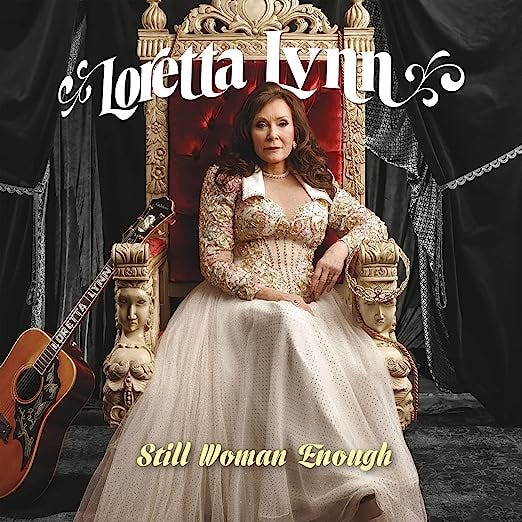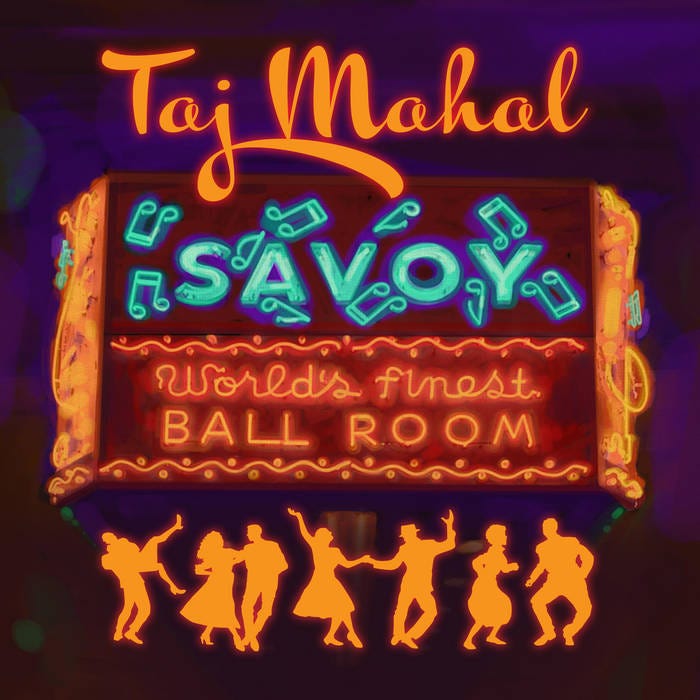Xgau Sez: June, 2023
Artistic vitality and momentousness considered, the blind pull, metallic K.O. without arrogance, journalistic angels, and some thoughts about the Beatles.


For your musicians doing great work in their eighties [Xgau Sez, May 2023] I would surely add Loretta Lynn. Full Circle and Still Woman Enough are great albums, and her voice hadn’t crumbled a bit — Kenneth C. Stillman, Columbus, Ohio
Amen to that. You always forget people when you assemble life lists off the top of your head—like for instance Taj Mahal, prominently featured in the June CG—and while I wouldn’t say Lynn’s voice shows no signs of wear in the two fine albums she made in her eighties it comes close enough. Anyway, the illusion of youth isn’t the point. Artistic vitality is the ticket, and she was a wonder.
Any thoughts on Tina Turner since her passing? I appreciated your pieces on Aretha Franklin, Prince, and David Bowie after they had passed. Though I know you were no big fan of Turner, I do think she holds importance as a black woman who undoubtably is categorical rock as opposed to r&b, blues, soul, etc. And of course the success she achieved after she entered her forties in an industry which favors youth. — James Kean, Liverpool
Aware that I’d let her passing pass, I’ve wondered about this myself. But without question Franklin-Prince-Bowie were all deeper and more aesthetically momentous. Were/are you a big Tina fan? Of what, exactly? First successful Black female rock artist, check. As such, however, very showbiz. Also as such, better than the Foo Fighters but not Nirvana or arguably Meshell Ndegeocello either. Absolutely I’m glad she escaped Ike, and glad too that she got richer without him. He was a beast. But he was also a genius going back to Jackie Brenston’s 1951 rock and roll precursor “Rocket 88,” and I’m not convinced she remained as complex and singular an artist without him. When Etta James died, my longtime admiration flowered into something richer and more complex. So far that’s not happening with Tina.
Do you ever feel like listening to Ani DiFranco or Modest Mouse? Near great artists that never made an undeniable album, but is there any album of theirs that you want to pull out once in a while? — Nicolas Auclair, Montérégie, Québec
There are fine albums I’ll never hear again if I live to 100. If you’ve admired and enjoyed (and own) as many albums as me, that’s just the way listening is. Of your two examples, DiFranco is much the less consistent—you could look it up. But she’s also the one I’d be more likely to pull out, because her evolving feminism remains complex and provocative (or so I believe without doublechecking). This is why I often resort to what I call the blind pull from my shelves. Most recent winner: Sarge. Sounded good-not-great.
I found a logic thread in the fact that you gave a positive review to a number of underrated records: all Big Black, Motörhead’s Orgasmatron, Clash’s Cut the Crap, Dirty Work by Stones, and Tim by ones who hate answering machines, which in my opinion are the pinnacle of hard rock in the ‘80s (I personally define them as metal in a way you say). Desperate vocalising and convincing guitars and lots of treble here and there (but top songwriting there). I think of it as a metal music purist. What do you think? — Oleksii, Chertnihv, Ukraine
As someone who dislikes the inflated grandiosity and pseudoclassical pretensions of metal, I agree that all these albums generate the kind of emotional power metal aspires to without, Steve Albini’s Big Black excepted, giving off a telltale whiff of arrogance. As a grouping it makes sense, and it's gratifying to infer that it helps get you through your endangered days. Thanks for writing.
I just finished reading Chasing History: A Kid in the Newsroom by Carl Bernstein. It tells the story of his entry at age 16 into the newspaper business. Two things struck me. One, he was destined for success from day one. Two, several people he encountered early on magnified and nurtured his abilities, and he speaks lovingly of their role in making him who he is today. Can you identify one or more individuals who played that part in your inevitable rise to the top. — Andrew Maslar, Baltimore
First of all, this is an apples-and-oranges comparison. Carl Bernstein saved the republic. All I did was save Tin Pan Alley for the Ramones and James Brown, which was far more “inevitable” in any case than I was. But if I had an angel it was editor-turned-publisher Clay Felker, who when I was already 23 gave me a spec assignment that turned into “Beth Ann and Macrbioticism,” the best piece of narrative journalism I’d ever write and my ticket to a living that flowered into a short-lived “Secular Music” column at Esquire and took decisive shape when Felker bought The Village Voice in 1974 and made me the kind of music editor he had no idea was coming. For more, check out the obit I wrote for the National Arts Journalism program’s ARTicles in 2008.
I’m curious to hear what you think about the recent women-led revisionist critique of the Beatles and their work (see this Guardian article ). Podcasts like Diana Erickson’s One Sweet Dream and Erin Weber’s excellent book The Beatles and the Historians have challenged a lot of the calcified Boomer narrative surrounding them (i.e. the myth of Saint John, Philip Norman’s shoddy scholarship, etc.) It’s interesting to note (a little funny I must admit) that you, as a feminist, are not held in high regard amongst this new crop of feminist critics given your “Shoulda been Paul” comments after John’s murder as well as your general dismissiveness of Paul (and George). Have you ever apologized for that comment, btw? — Anthony Volpe, Roslindale, MA
Let me straighten out a few of numerous misconceptions. As I’ve said many times, I don’t have time for podcasts because I use my ears for music, pretty much nonstop unless I’m watching TV with my wife. Who, how about that, was the person who uttered the supposedly Paul-targeting question I included in the Lennon obit I crushed out on a tight deadline in the seven-eight hours after he was murdered. To quote: “Why is it always Bobby Kennedy or John Lennon? Why isn’t it Richard Nixon or Paul McCartney?” Which after all these years I’m still apparently obliged to point out was not to equate McCartney with Nixon much less wish McCartney dead but to throw up her hands at the dire psychology of assassination, which I then attempted to explicate. As for women leading some U.K.-based, academia-mottled, feminist revision of Beatles history, maybe I’ll pay attention when it comes from someone smarter than those quoted in the ramshackle piece of arts-page filler you linked to. More Beatles scholarship is always welcome—for sure they weren’t perfect human beings. But it’s highly unlikely any of it will be as rich as Rob Sheffield’s superb 2017 Dreaming the Beatles, which explicates in fond, awestruck detail how crucial and perceptive the teenaged girls who made the Beatles famous were. In this connection I also recommend Robert Zemeckis’s 1978 flick I Wanna Hold Your Hand, a Beatlesless Beatles movie that focuses on their female fans. And I’ll note that one of the women the Guardian piece features grew up in Cleveland, where early on the Plain-Dealer hired a female rock critic who preceded Paul Williams, Richard Goldstein, Jann Wenner, me, and everybody else. Her name was Jane Scott, she hung in there till 2002 when she turned 83, and what really hooked her was the first time she covered the Beatles. A long time ago she wrote about them a lot.



